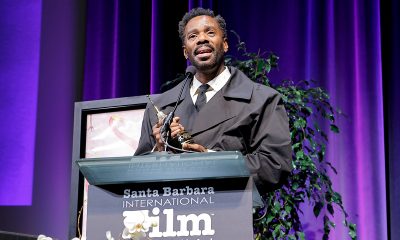Arts & Entertainment
Dishing with Bruce
Hollywood funny guy on ‘70s drugs, the Oscars and hanging out with Robert Reed
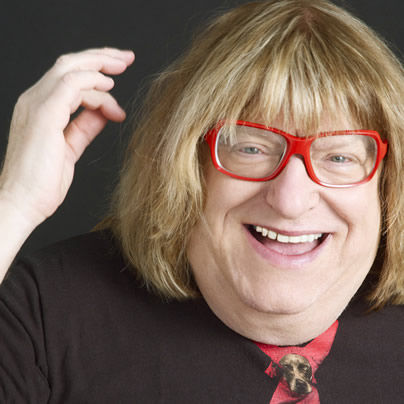
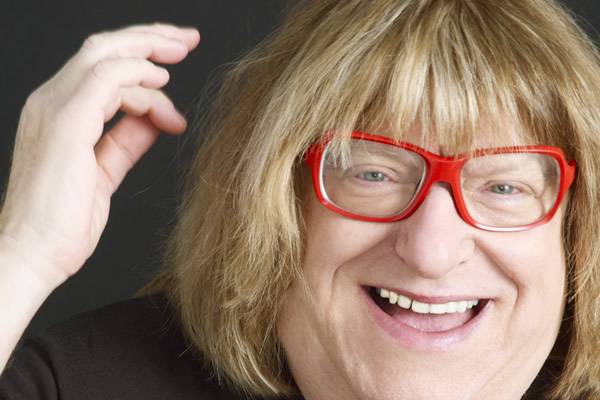
Bruce Vilanch is in town to honor Carol Burnett at the Kennedy Center this weekend. He’s at Cobalt Friday night. (Photo by Rick Stockwell)
Bruce Vilanch — perhaps America’s favorite gay funny man — will be at Cobalt Friday night to greet fans. Famous for his Oscar jokes and appearances on “Hollywood Squares,” we caught up with him by phone two weeks ago where he was in a jovial mood, cracking jokes the whole time. His comments have been slightly edited for length.
WASHINGTON BLADE: Is it harder to make people laugh in the Internet age? How do you still make people laugh when they’ve seen it all?
BRUCE VILANCH: Well yeah, it’s harder to come up with original stuff because someone will write something, post it online then it’s out there before it’s even been performed. It’s like instantaneous. So it’s harder now to surprise people. But on the other hand, people are so much more connected now that they get every joke. Things are in touch almost to a sickening amount so that by the time you try something live, they get every reference because they’ve had a chance to be exposed to it. I guess there are plusses and minuses. I think also the chances of offending somebody have quadrupled.
BLADE: Why?
VILANCH: Everybody feels their opinion is valid and they have a place to post it publicly now. It used to be reserved for the people who had the platforms but now anybody can post their opinion.
BLADE: Is it hard to keep doing it? I think many of us outside of Hollywood imagine it must be constant pressure.
VILANCH: Well, you have to keep working at it. Fortunately as a writer, you can generate your own work. Actors have a hard time doing that. But then you have to go off and try to sell it. You can never afford to be asleep at the switch, unlike the people who run trains in Chicago. But thankfully there are no real term limits on these kinds of things. I guess at a certain point you start fighting a creeping ageism but if you’re distinctive enough, people don’t mind. Everybody loved Rodney Dangerfield and now he’s up there with God. God must be happier now.
BLADE: What brings you to our fair city?
VILANCH: I’ll be in town to be part of the Mark Twain Prize ceremony to Carol Burnett at the Kennedy Center (on Sunday), so while I’m here I’ll be making a little appearance at Cobalt as well.
BLADE: Will you be performing at Cobalt?
VILANCH: Not really a performance. More of a meet-and-greet and maybe answer some questions. And getting some phone numbers hopefully. Facebook is unreliable. You have to save them in your phone.
BLADE: Did you do any writing for Carol’s show back in the ‘70s?
VILANCH: No, I never did. She and her husband at the time believed in hiring writing teams. They seemed to like what they were getting with the contracts for a writing team and I didn’t have a writing partner. I had a sex partner, but that’s not what they were interested in. Later I worked with her on some specials and some personal appearances but not anything where she was in character.
BLADE: What was the show she did in the early ‘90s on NBC?
VILANCH: Oh yeah, “Carol & Company” I think. It did fairly well I think, but she stopped because she said it was like shooting a new pilot every week. Each episode was like a one-act play and that’s very hard to pull off on a weekly basis. I think she had some success with it but she just didn’t want to work that hard all the time.
BLADE: The Screen Actors Guild just came out with a study on actors and anti-gay discrimination. It seemed a little surprising considering how many power gays we have in Hollywood like Ellen and Neil Patrick Harris.
VILANCH: Who look remarkably similar, don’t they?
BLADE: We see lots of LGBT actors, but is it still squeamish in the boardrooms? What’s been your experience?
VILANCH: I think it’s a lot less squeamish than it was. I’m not really in the boardrooms, so I can’t really comment on that. It’s just like every place generally. We’ve become part of the mainstream. We’re probably getting very close to having a big male action or romantic star who’s gay. I don’t know who it would be. Maybe if Cheyenne Jackson got a big role or something we could test the long-held theory that they won’t buy you in a big action or romantic role if you’re gay. It’s happening more in pro sports. … Maybe someday we’ll have somebody say, “Yes, I’m James Bond. And I enjoy a good old fudgepacking.”
BLADE: Of course we have to talk about the Oscars. The host job seems notoriously brutal. The critics seem like they can’t wait to hate anybody new who tries it. Yet you always seem to come out smelling like a rose. Is it because you’re not out there on stage?
VILANCH: I’m flattered you think that but obviously you don’t read the same blogs I do. I get slammed all the time. I get slammed for Oscar shows I didn’t even write, that I had nothing to do with. People are always saying, “Why don’t they get rid of that guy?” I’m like, “Well, if you stayed to read the credits, you’d see,” but I guess nobody is awake to read the credits at 4 or 5 in the morning so I really can’t blame them. But that’s the hallmark of the Internet really. People cutting loose with ignorant opinions, so I continue to get blamed. I feel like I wake up covered in mud. Even when the show’s a hit, or I win an Emmy, people are saying, “Oh, it was boring, it was horrible.” I remember the producer of the Oscar show used to have two framed reviews on his office wall. One was a rave from the New York Times and one was a slam from the Los Angeles Times. They were as extreme as they could be and they were about the same show. So you really never win, except, I guess, when you do.
BLADE: But why are people so tough on the host? I remember watching David Letterman and Jon Stewart do it and laughing throughout the night. They may not have been the best ever, but they didn’t seem to me to be as bad as everybody thought they
VILANCH: Well, just by the sheer numbers you realize that a lot of people who watch must be unfamiliar with these hosts beforehand. Suddenly you’re up there in front of 35 million people, so everybody has an opinion. And they’re working within a certain limitation, so they can’t just do what they do on their own shows. And sometimes things play differently at home but didn’t play that well in the house. Sometimes it’s just the wrong energy. With Letterman I think it was kind of like, “OK, we don’t need TV boy here coming out and making fun of our names.” But then he used that as a running gag on his own show forever. … And a lot of these people who watch aren’t even people who go to the movies. It’s like people watching the Super Bowl who never watch football. It’s just kind of a cultural experience people feel they have to share in. It’s like the people going out on New Year’s Eve and that’s the only time they go out. So you’re not always working with the best possible audience to be honest.
BLADE: You wrote for the “Brady Bunch Hour.” Was Robert Reed out to you?
VILANCH: Oh sure. He lived with his mother but we would go out to clubs together. He was kind of into rough trade. But he was afraid to go anywhere much because he was afraid of being seen. So we would arrange to sit back in some dark corner. It was very pre-Stonewall. I mean, it wasn’t technically pre-Stonewall, but it still felt like pre-Stonewall.
BLADE: What was he like? Was he fun to hang out with?
VILANCH: Well, he was so deeply closeted it was hard to get him to let loose and just have fun. He was always very nervous about it. A lot of these people living this kind of big secret tend to be pretty tightly wound because so much is at stake. But yeah, once you broke through all that, he was fun. I was always out and I was this big flamboyant comedy type and he was comfortable with me. I kind of helped him lubricate his way so to speak (laughs).
BLADE: For all the great stuff you’ve done, you’ve also been involved in some of the most ignominious bombs in all of pop culture history with stuff like “The Brady Bunch Hour” and the “Star Wars Holiday Special.” I hope you’re not offended by this question, but did you have any sense at the time, these would attain such train wreck
VILANCH: Well, you always go into something thinking it’s a good idea but you have to remember, this was the ‘70s and so we were all a bit chemically altered at the time. You have to also realize, like with the Brady show, this type of variety show concept was still popular at the time. We didn’t realize it was breathing its last. It’s the kind of thing that could have been really terrific if any of them could sing and dance. I mean they did a little on their original show but it became clear pretty quickly when we tried this sort of hybrid thing, that it wasn’t going to work. It’s still fun to roll the dice. Now had you told me if would have become like this kind of cult thing, that would have surprised me at the time.
BLADE: Obviously when you’re writing an awards show, you have to know the material that’s nominated. How do you have time to watch whole seasons of TV shows and all the Oscar nominees?
VILANCH: Well, it’s a lot easier than it used to be because they just send you screeners now and you can sit at home. It sure beats having to go to screenings, which were horrible experiences. No popcorn. But I go to the movies anyway. To get paid for it just tickles me to no end.
BLADE: Obviously most of us are not Hollywood insiders, so something I’m always curious to ask people who are is this: Does the cream always rise or have you seen true cases of highly talented people who just never got the right break? Sometimes it feels surprising to watch some of the stuff that does get a green light.
VILANCH: Have I seen people fall through the cracks, yes I have. There’s a feeling that there’s a kind of natural selection at work and it’s survival of the fittest. You kind of have to have the right combination too. It’s not always enough to just have the talent. You have to have the talent and the ambition and the kind of personality that allows you to hang in there long enough and have a thick hide so that you can get through life with all that rejection. So yes, there have been lots of people who didn’t have just that right combination. Maybe there were too dependent on something or they just didn’t have the oomph to push themselves through. With others, the talent seems to rise briefly because they get lucky but the ones who really last really do have unbelievable stamina and manage to break through all the other stuff. It sounds terribly dry, but it’s true.
BLADE: Where do you live?
VILANCH: In West Hollywood. I was up in the Hills for 28 years, but now I have a fabulous loft right on the boulevard. I stand out on my balcony like Eva Peron for the AIDS Walk and Pride and Halloween. And now I can stagger home.
BLADE: Do you hang out at gay bars in West Hollywood?
VILANCH: Yeah, some. Usually the reason you go out to a bar is to meet people who don’t answer your job description. But now there’s Grindr and that stuff, so you don’t have to go out as much.
BLADE: Some of the stuff they try for the Oscars seems a little head scratching at times. Like one year, they handed out some categories down in the aisles. Another year they had all the nominees come up on stage. Do you have any say in those kinds of decisions?
VILANCH: Um, no. Listen, at the time that kind of stuff is usually a response to some criticism that’s come up. Like that year, somebody had said, “Gee, how can we save some time here?” All those technical awards, the people are sitting in the back and it takes them so long to get to the stage. Somebody thought maybe having some of that done in the aisle would save some time. That was the perceived solution, but then everybody thought it made them seem like second-class citizens. There’s a little bit of reinventing the wheel every year but with a lot of it, there’s not a whole lot you can do. And the networks aren’t really upset with the long running time, because that just allows them to sell more ads so even when it’s absurdly long, they’re still pretty happy. I think one year they added like three or four honorary awards and that ended up adding like 45 minutes to the show and the network said, “OK, guys, this is a little ridiculous.” But one thing that’s worked is to hand some of those technical awards out at its own separate function, then just show highlights as a clip package and that saved a lot of time. The innovation I really liked the most was when Bill Condon had previous winners come out and salute the nominees individually. Then they said, “Oh it was too long,” so they only did it in two categories the next eyar and it didn’t have the same impact at all. I thought it was a fabulous innovation but the only problem was after awhile you would run out of previous winners. You only get one each year in each category.
BLADE: Well, you could just keep having Luise Rainer (age 103) come out every year to do it, God bless her. She’s been great about coming back for the milestones.
VILANCH: Yes, wasn’t that great? And one year Olivia de Havilland flew in from Paris, that was just great too.
BLADE: What’s one thing you miss about ‘70s-era Hollywood and one thing you don’t miss?
VILANCH: Well I guess I miss the drugs. It was the ‘70s so there was all this hedonism so you had that and the porno mustaches, which I love. But on the other hand, to be honest, I don’t miss the drugs. I really don’t miss everybody being loaded all the time and they really were. It was probably the first time there was really this relentless
VILANCH: Um, no. Listen, at the time that kind of stuff is usually a desire to be young and that really hasn’t gone away but it was hysterical then when I was young. People would be wearing these flowered shirts with love beads and just trying very hard to be hip when really they were all barracudas. They did make us laugh.
BLADE: For all of us gays who love Carol, but will never get to schmooze with her, please give her our regards.
VILANCH: (laughs) OK.
Travel
Manchester is vibrant tapestry of culture, history, and Pride
Alan Turning Memorial is among English city’s many attractions
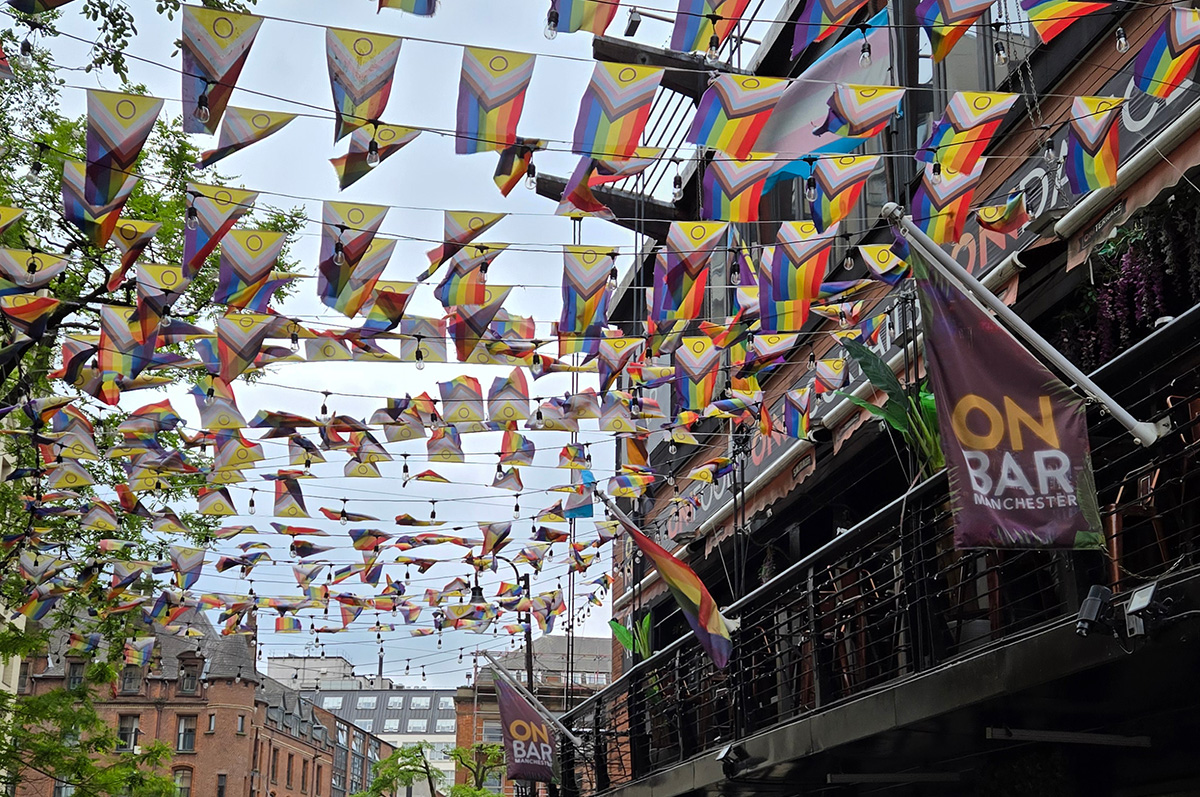
Manchester, England, is not only famous for its industrial heritage, music scene, and football clubs — it’s also home to one of the most vibrant and historically significant LGBTQ communities in the U.K. Often referred to as the “gay capital of the North,” Manchester has been a pioneer in LGBTQ rights, visibility, and celebration, cultivating a culture of inclusivity that continues to thrive today.
The roots of Manchester’s LGBTQ history stretch back centuries, but it was during the 20th century that the city truly became a hub for activism and progress. In 1880, a scandal known as the “Manchester Drag Ball” brought national attention to the city when police raided a fancy dress ball attended by men in drag. Though the incident was used to stigmatize the community, it also marked one of the first widely publicized moments of queer expression in the city.
Manchester is home to several institutions that preserve and celebrate queer history. The LGBT Foundation, based in the city, is one of the U.K.’s leading LGBTQ charities, providing health and support services as well as educational resources.
The city is also immortalized in pop culture as the backdrop for “Queer as Folk,” the groundbreaking 1999 television series created by Russell T. Davies. The show, set in Manchester’s Gay Village, helped bring the realities of LGBTQ life to mainstream audiences and played a pivotal role in shaping public attitudes.
Manchester, is a city that lives and breathes resilience. It’s a place where cobblestone streets echo with the voices of industrial workers, punk rockers, activists, and proud members of the LGBTQ community. I came here seeking stories — some hidden in old libraries, others pulsing through neon-lit streets — and left with a sense of belonging I hadn’t expected.
My base for this journey was the magnificent Kimpton Clocktower Hotel. Located in a former insurance building dating back to the 1890s, it seamlessly marries historic grandeur with modern luxury. Walking through its doors felt like entering a different era. The soaring ceilings, intricate tilework, and dramatic staircases told stories of old Manchester, while the in-room record players spinning tracks by Oasis made sure I knew exactly where I was.
The heart of the hotel is The Refuge, a restaurant and bar that buzzes with energy. Whether sipping cocktails beneath the Winter Garden’s lush greenery or sharing small plates that borrow flavors from around the world, I felt immersed in the city’s welcoming vibe. Even in its luxury, the Kimpton feels like a place for everyone, especially when there is a DJ spinning some cool jazzy beats.
One thing I loved about this property is their “Forgot it? We’ve got it” service. Whether its toothpaste, a shaving kit, or phone charger, the helpful staff have you covered. I tend to forget at least one necessity on every trip. The Kimpton’s central location places guests within walking distance of Manchester’s vibrant cultural scene, including the Palace Theatre, Canal Street, and various shopping and dining options.
My first stop in Manchester was the John Rylands Library, an architectural marvel of neo-Gothic design. I was there specifically to view “The Secret Public” exhibition. It traces Manchester’s underground art scene, especially its ties to queer culture and punk resistance. Flyers, magazines, and photographs are on display.
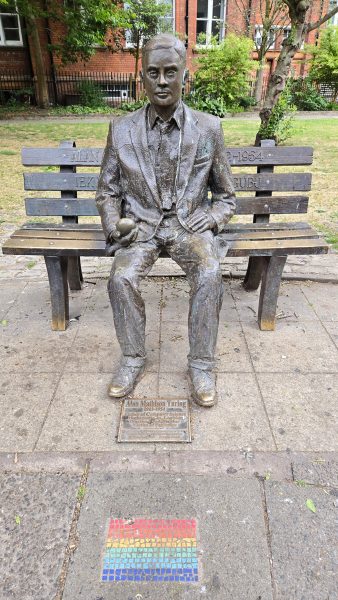
And while we are on the topic of LGBTQ history, the best way to understand Manchester’s queer roots is by talking to the locals. The Free Manchester Walking Tours offers a Queer History Tour, led by passionate guides who have in depth knowledge of the city’s LGBTQ history and culture. We began our tour in Sackville Gardens, home to the Alan Turing Memorial and the Beacon of Hope, a tribute to those affected by HIV/AIDS. It’s a space for reflection, nestled just beside Canal Street’s constant thrum. For those not familiar with Alan Turing, he was a pioneering mathematician and computer scientist, best known for his role in cracking the German Enigma code during World War II, a breakthrough that helped shorten the war and save countless lives. Often regarded as the father of modern computing, Turing laid the theoretical foundation for artificial intelligence. Despite his monumental contributions, he was persecuted for being gay, ultimately leading to his tragic death in 1954. Today, he is celebrated as both a scientific genius and a symbol of the ongoing struggle for LGBTQ rights.
No trip to Manchester would be complete without a night — or three — spent in the Gay Village. Centered around Canal Street, it’s a place that radiates warmth and freedom. What once was a hidden, underground scene in the 1980s has become a global symbol of LGBTQ pride.
During the day, you’ll find people sipping coffee along the canal and by night, the rainbow flags light up the street. Spaces like Via and the Eagle pulse with music and laughter, while Cruz 101 remains a sacred institution for dancefloor devotees. This is more than a party district; it’s a cultural hub, one that has helped shape national conversations and lead by example.
Manchester’s gay scene is more than just nightlife. In the Northern Quarter, I stumbled into Feel Good Club. a queer-owned café that quickly became one of my favorite stops during my trip. Feel Good Club is a café but the space also hosts workshops, mental wellness events, and spontaneous conversations with strangers who somehow feel like old friends. I ordered a bowl of apple-soaked oats and I have to say, it was one of the most delicious and inexpensive things I ate during my entire trip to England. I should have asked for the recipe!
A few blocks away sits Queer Lit, an LGBTQ bookstore filled to the brim with stories I wish I’d had growing up. From queer romance and fiction to books on trans identity and intersectionality, the shop is both cozy and revolutionary. Queer Lit claims to have the largest selection of LGBTQ books in all of Europe. Beyond books, the store hosts events such as workshops, live readings, and book clubs, providing a safe and inclusive space for the community to gather and celebrate queer literature. They also serve a variety of beverages. I would definitely recommend trying one of their hot chocolate drinks.
Though my trip didn’t coincide with Manchester Pride, visitors can expect tens of thousands each August. Pride here features a blend of celebration and activism. From glitter-filled marches to thoughtful panel discussions, it’s a reflection of the city itself: joyful, inclusive, and unafraid to speak truth to power. Importantly, the money raised goes straight back into the community, funding LGBTQ+ health initiatives, charities, and support services. Also in August is SCENE, Manchester’s LGBTQ+ Film and TV Festival, which consists of a week of new and classic LGBTQ cinema and TV screenings, panels, and other events.
All this touring and learning about queer history made me hungry, so for dinner, I ventured to Maray, a Middle Eastern-inspired gem in the city center. Its signature “Disco Cauliflower” — roasted whole and topped with tahini, pomegranate, and harissa — was a revelation. The food, like the city, defied expectations. It was spicy, complex and comforting. I would also recommend trying the crispy sea bass with broccoli slaw. Maray’s vibe is relaxed yet refined, a perfect place to unwind after a day of exploration. Its inclusive, welcoming spirit felt aligned with everything I’d experienced in Manchester so far.
For a more casual dining experience, head over to Freight Island, a unique food hall and entertainment venue located near Piccadilly Station. The venue features a variety of locally owned food stalls including Mia’s Arepas, Ornella’s Little Kitchen and Mega Gyros. It’s a great place to grab a quick bite or cocktail after work with friends.
Manchester may not be as polished as London, but that adds to its charm and intrigue. I tend to enjoy cities like Manchester over their larger neighbors. During my entire stay, I was able to walk to every attraction I visited and by experience, the best way to see a city is on foot. It’s also a great way to burn off those extra calories.
Whether you’re wandering Canal Street at sunset, or simply sipping hot chocolate at Queer Lit, Manchester is a place where you can be yourself and belong.
Enjoy the journey!
Books
Embracing the chaos can be part of the fun
‘Make Sure You Die Screaming’ offers many twists and turns

‘Make Sure You Die Screaming’
By Zee Carlstrom
c.2025, Random House
$28/304 pages
Sometimes, you just want to shut the door and forget what’s on the other side.
You could just wipe it from your memory, like it didn’t occur. Or create an alternate universe where bad things never happen to you and where, as in the new novel “Make Sure You Die Screaming” by Zee Carlstrom, you can pretend not to care.

Their mother called them “Holden,” but they’d stopped using that name and they hadn’t decided what to use now. What do you call an alcoholic, queer, pessimistic former ad executive who’s also “The World’s First Honest White Man,” although they no longer identify as a man? It’s a conundrum that they’ll have to figure out soon because a cop’s been following them almost since they left Chicago with Yivi, their psychic new best friend.
Until yesterday, they’d been sleeping on a futon in some lady’s basement, drinking whatever Yivi mixed, and trying not to think about Jenny. They killed Jenny, they’re sure of it. And that’s one reason why it’s prudent to freak out about the cop.
The other reason is that the car they’re driving was stolen from their ex-boyfriend who probably doesn’t know it’s gone yet.
This road trip wasn’t exactly well-planned. Their mother called, saying they were needed in Arkansas to find their father, who’d gone missing so, against their better judgment, they packed as much alcohol as Yivi could find and headed south. Their dad had always been unique, a cruel man, abusive, intractable; he suffered from PTSD, and probably another half-dozen acronyms, the doctors were never sure. They didn’t want to find him, but their mother called…
It was probably for the best; Yivi claimed that a drug dealer was chasing her, and leaving Chicago seemed like a good thing.
They wanted a drink more than anything. Except maybe not more than they wanted to escape thoughts of their old life, of Jenny and her death. And the more miles that passed, the closer they came to the end of the road.
If you think there’s a real possibility that “Make Sure You Die Screaming” might run off the rails a time or three, you’re right. It’s really out there, but not always in a bad way. Reading it, in fact, is like squatting down in a wet, stinky alley just after the trash collector has come: it’s filthy, dank, and profanity-filled. Then again, it’s also absurd and dark and philosophical, highly enjoyable but also satisfying and a little disturbing; Palahniuk-like but less metaphoric.
That’s a stew that works and author Zee Carlstrom stirs it well, with characters who are sardonic and witty while fighting the feeling that they’re unredeemable losers – which they’re not, and that becomes obvious.
You’ll see that all the way to one of the weirdest endings ever.
Readers who can withstand this book’s utter confusion by remembering that chaos is half the point will enjoy taking the road trip inside “Make Sure You Die Screaming.”
Just buckle up tight. Then shut the door, and read.
The Blade may receive commissions from qualifying purchases made via this post.

‘A Wrinkle in Time’
Through July 20
Arena Stage
1101 Sixth St., S.W.
Tickets range from $59-$209
Arenastage.org
Currently at Arena Stage, talented out actor and singer Taylor Iman Jones is rekindling an old friendship with an adored character of fiction.
Broadway vet Jones is starring as 13-year-old Meg Murry in “A Wrinkle in Time,” the world-premiere musical adaptation of Madeleine L’Engle’s same-titled book.
For many readers, especially women, the classic 1962 young adult novel, was their first foray into sci-fi, particularly one with a female protagonist.
The story centers on Meg, an awkward schoolgirl whose physicist father has mysteriously disappeared. Now, Meg, her popular friend Calvin, and smart younger brother Charles Wallace are tasked with moving through time and space to find him. Along the way they encounter adventure and evil.
For Jones, 33, playing 13-year-old Meg feels freeing in ways. She says, “As you get older, you’re told to grow up, so I like letting go of some of that. To feel feelings in their rawest form and to tap back into that is fun. I like the spontaneity. There are highs and lows to revisit.”
Born and raised in the San Francisco Bay Area, Jones began piano lessons at just six and soon added band and plays to their pursuits. Following high school, she made a deep dive into California theater for seven years before making the big move to New York in 2017 where after just two months she was singing on Broadway.
The determined and appealing Jones, who lives in New York with their partner, boasts an impressive bio. She has appeared on Broadway as Catherine Parr, Henry VIII’s sixth and final wife in Six, and in the original casts of “Head Over Heels” and “Groundhog Day.” She’s been seen in national tours of “Hamilton” and “American Idiot.”
WASHINGTON BLADE: It seems “A Wrinkle in Time” and Meg mean a lot to a lot of people.
TAYLOR IMAN JONES: The book tells the story of a girl with so much undiscovered power who’s accomplishing things she never imagined that she could.
BLADE: Can you relate?
JONES: Meg wears her emotions on her sleeve. I can certainly relate to that. I’m a Pisces. Sometimes being hyperemotional and very empathetic can feel like a burden, but as I’ve matured, I have realized that it’s not a bad quality. And it’s something I’ve learned to harness and to enjoy. I love that I can play a role like Meg in front of thousands of people.
BLADE: Was “Wrinkle in Time” a book you knew well?
JONES: Oh yeah, it’s a favorite book that lives in my heart and my mind. It’s one of the first books that taught me about the adventure of reading.
BLADE: And playing a favorite character must be a kick.
JONES: It really is.
BLADE: Meg is a big part in a big show.
JONES: This musical is huge. They’re traveling through space and meeting people on different planets. 20-person cast. 30 songs in the show. Quite the undertaking and I’m proud of us. I’m on stage for the entire musical and I sing four or five numbers.
As a mezzo soprano I guess you’d say I have the luxury of being able to do a lot of musicals that span a lot of different genres: rock musical, pop musical, and standards. “A Wrinkle in Time” is contemporary musical theater.
For me, singing is probably the least difficult part of the show. What’s harder for me is the way Meg experiences trauma; I need to be careful when I’m screaming and yelling.
BLADE: It seems mostly women have been involved in making this production happen (book by Lauren Yee; music and lyrics by Heather Christian; directed by Lee Sunday Evans; and choreography by Ani Taj.)
JONES: It’s true, the director, writer, etc., and most of our producers are all women. This doesn’t happen most of the time. For me it means new ideas and fresh energy, and pushing the limits of musical theater.
It’s also created a wonderful space in which to work. It can be more generous, and understanding. And centering the story on a young girl is something we can all relate to.
BLADE: Will “A Wrinkle in Time” resonate with queer theatergoers and their families?
JONES: I think so, especially on the heels of pride month. It’s truly a show for all ages about finding your inner strength and fighting for the things that you love; not letting evil win over the power of good, and not just for yourself but for those around you too.



